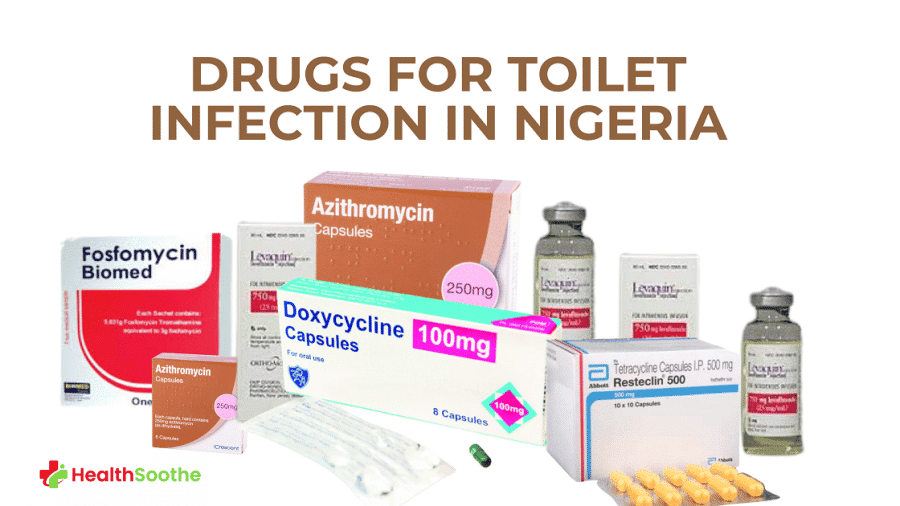Are you having some rashes down there? And it's not too serious to require the services of a professional medical doctor or nurse. Somehow all you need is just some pills and you'll be okay.
But then you're not so sure which drug you should get, and that's exactly why you are here!
When micro-organisms enter the body and trigger a negative response, infection ensues. In this piece, we'll talk about the drugs used to treat toilet infections in Nigeria.
However, you should not at any point take issues like this unserious. I strongly recommend you go see a doctor and have yourself tested even as you follow this article's guide.
Before we go into the numerous medications for toilet infection in Nigeria, it's important to understand what a toilet infection is, the many forms of toilet infections, their causes, and their symptoms.
READ ALSO: List of Medicine and Drug Prices in Nigeria in 2022
TOILET INFECTIONS
Toilet infections, sometimes known as toilet diseases, are conditions in which a person has a burning, itching, and an unpleasant or foul odour emanating from the private regions or genitals, with liquid oozing out on occasion.
Most individuals believe they start feeling difficulty after using a public toilet seat, hence it's termed toilet infection.
Toilet infections, regardless of how they are perceived, may be very painful and even humiliating, especially if the itching occurs when you are out in public.
Both sexes and genders are affected by toilet infections.
Types of Toilet Infection
There are many various sorts of toilet infections, but I'll go through the most prevalent ones in this essay.
- Bacterial Vaginosis
- Vaginal Yeast Infection
- Trichomoniasis
- Gonorrhoea
- Chlamydia
- Non-Infectious Vaginal Yeast Infection
- Viral Vaginal Yeast Infection etc.
Causes of Toilet Infection
Below are some of the most prevalent causes of toilet infection.
- Squatting while peeing
- Contacting diseased toilet regions with genitals or private parts
- Incorrect way of washing the anus after defecating
- Vagina douching
- The use of fragrances in the private area
- Usage of unclean toilets; and
- Poor personal hygiene
Signs and Symptoms of Toilet Infections
- Rashes, boils, or pimples on the genitals are the most common symptoms.
- Itching, burning, redness, and swelling of the private areas
- Vaginal or vulval dryness in females, and penile dryness in men.
- Urinary discomfort and sex discomfort.
- Discharges from the vaginal or penis that has a foul odour.
Drugs for Toilet Infection in Nigeria
Doctors and other medical professionals have cautioned that simple bathroom infections, if not treated appropriately, may lead to staphylococcus, pelvic inflammatory disease (PID) which is one of the leading causes of infertility.
As a result, we'll have to mention a couple of the NAFDAC drugs that have been approved and certified to treat toilet infections.
In Nigeria, drugs for toilet infection include;
Levofloxacin (Levaquin)
It is an antibiotic medicine that is offered under the brand names Levaquin and others and is one of the finest treatments for toilet infection treatment in Nigeria. Acute bacterial sinusitis, pneumonia, H. pylori, urinary tract infections, chronic prostatitis, and various kinds of gastroenteritis are among the bacterial illnesses that may be treated with this medicine.
Doxycycline
This antibiotic belongs to the tetracycline family and is used to treat infections caused by bacteria and parasites. Bacterial pneumonia, acne, chlamydia infections, Lyme disease, cholera, typhus, and syphilis are all treated with this drug. It works in conjunction with quinine to prevent malaria.
Tetracycline
Tetracycline is an antibiotic that treats bacterial infections. Tetracycline is an antibiotic that is used to treat bacterial infections in the skin, intestines, respiratory tract, urinary tract, genitals, lymph nodes, and other parts of the body.
Azithromycin
In Nigeria, azithromycin is an antibiotic used to treat toilet infections. It may also be used to treat a broad range of bacterial infections. Illnesses in the middle ear, strep throat, pneumonia, traveller's diarrhoea, and various intestinal infections are examples.
Fosfomycin (Monurol)
Mongol is an antibiotic that is used to treat urinary tract infection and bladder infection symptoms.
Norfloxacin (Noroxin)
Noroxin is a prescription medicine that is used to treat bacterial gynaecological infections, prostate gland inflammation, gonorrhoea, and urinary tract infections.
Sulfamethoxazole/Trimethoprim (Bactrim, Septra)
The antibiotics sulfamethoxazole and trimethoprim are combined in this prescription. It's a drug that's used to treat bacterial infections (such as middle ear, urine, respiratory, and intestinal infections). It's also effective in preventing and treating a certain kind of pneumonia (pneumocystis-type).
Ciprofloxacin (Cipro)
Ciprofloxacin belongs to a class of antibiotics known as quinolones. It's used to treat bone and joint infections, intra-abdominal infections, some types of infectious diarrhoea, respiratory tract infections, skin infections, typhoid fever, and urinary tract infections, among other bacterial illnesses.
Nitrofurantoin (Macrobid, Furadantin)
Nitrofurantoin (Macrobid, Furadantin) is an antibacterial medication that treats bladder infections but not kidney infections.
READ ALSO: Top 10 Drugs for Purging in Nigeria (Diarrhea Treatment)
Conclusion
One should be cautious about one's health since one might easily get into touch with something he or she is not supposed to, which can be harmful to the body system.
We should be quite conscientious about our hygiene, particularly when it comes to toileting and ablutions.
Maintain a clean environment free of bacterial and viral illnesses so you don't come into touch with anything you shouldn't.
Please be aware that fluoroquinolones including Ciprofloxacin, Ofloxacin, Levofloxacin, and Norfloxacin have been linked to birth abnormalities in newborns when used during pregnancy. Before using any of the above-mentioned medications, see your doctor.
The content is intended to augment, not replace, information provided by your clinician. It is not intended nor implied to be a substitute for professional medical advice. Reading this information does not create or replace a doctor-patient relationship or consultation. If required, please contact your doctor or other health care provider to assist you to interpret any of this information, or in applying the information to your individual needs.

